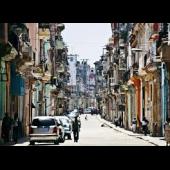An American in Cuba: Observations of the Grand Experiment in its 11th hour

I was in Cuba last week (Dec 6-13) on a cultural exchange for the Havana Film Festival (in other words I was there legally with a US State Department issued license). Three days after returning, the Obama administration announced the re-establishment of normal diplomatic relations with Cuba, making me one of the last Americans to experience Cuba in its current form, something I will personally forever value. On my trip I took ample notes of my thoughts and observations. Below are some fit for sharing. By no means am I suggesting that a week visiting Cuba and talking with locals make me any sort of expert on the country or its people, but the notes below are my honest assessment. So take it as you will. If you’ve been to Cuba and see something I got wrong or missed, please message me and tell me so.
Cuba: The Good
- Cuba has an educated, literate populace. This is not the norm for Caribbean island nations nor central American nations.
- Many, many bi-lingual people. I’d bet 20% of the populace speaks fluent English and >50% speaks some English. Seemed astonishing for a Spanish speaking culture with very little access to, or need for, the English language.
- Their healthcare system is excellent. Cuba actually exports doctors to other countries, so strong is their medical training.
- There is much value to unlock, economically and culturally. When the US lifts the embargo and IF Cuba embraces some hybrid form of capitalism/socialism (think China), the country could explode in growth. They have an educated, literate, bilingual populace, an excellent healthcare system that could be transformed into a growth industry, as well as natural assets in tobacco, sugar, nickel, and of course tourism.
Cuba: The Bad
- So many things. Hard to even list specifically.
- The biggest: Cuba hasn’t had significant capital investment really anywhere in 50 years. As such, they need a huge amount of capital invested just to “catch up”.
- Culture: Most Cubans only know communism. They have never lived nor worked in a competitive world driven by market economics. My fear is that they will either have trouble competing in an open market or worse, that they will be exploited by savvy capitalists (the very thing Castro’s revolution was about).
- Politics: The Castro brothers will be dead soon. Nobody knows what the future holds in terms of leadership and direction. My hope is that they have a Gorbachev/Yeltsin, but one with greater vision who won’t give away all of Cuba’s assets to a few connected oligarchs. My wish would be for them to look at China and embrace a hybrid form of socialism and capitalism, but one with much, much more regard for human rights and personal freedom. In other words, preserve the very fine national education and healthcare systems Cuba has built via socialism and embrace capitalism to repair and grow industry and infrastructure. Maybe none of that is possible, but I’ll hope for it.
Observations:
- Nearly everything in Cuba looks/feels abandoned or worn torn, except it’s not. It’s painfully obvious there has been little capital investment anywhere in decades.
- Any rational person need only to look around to determine that Cuba needs a massive capital infusion in the coming decades if it is to not crumble into socio-economic chaos. It is completely unsustainable in current form.
- How do Cubans view Americans? Cubans treat Americans almost like celebrities. That is, we seem to be a rare but desired species. Cubans seem very excited to learn you are from the US. Very curious about what we think. Very quick to say “I love the US”.
- Castro/Che propaganda is everywhere. Every public place seems to have pictures of Fidel or Che, or slogans like “Vive Fidel”. It is inescapable. Makes me really question the propaganda we experience in the US every day without a second thought. For example, how in the US we make children recite the pledge of allegiance as a form of nationalist indoctrination. Or how we play the national anthem before sporting events or fly the flag on our homes or other places. None of these things are inherently bad of course, but seeing Castro’s massive propaganda campaign to shape national thinking opened my eyes to the dangers of “blind nationalism”. We should never be “pro US” simply because we are told to do so by authority figures or because it is the politically correct thing to do. It’s important that we always question the motivations for our patriotism and be sure the reasons are to ensure liberty and freedom. Often times authority figures wrap themselves in patriotism to silence dissent. Reminds me of GWB saying “You are either with us or against us” and how after 9/11 we too quickly ceded our civil liberties to the government in the name of “security”, and only now realize how terribly hard it is to reacquire those same liberties.
- Compared to other first-world nations, Castro's grand experiment failed miserably. However if Cuba is compared to other Caribbean island nations (Haiti for example) or central American nations (Venezuela, Bolivia, Paraguay, etc) Cuba has many advantages, so much so that I doubt many Cubans would leave Cuba to immigrate to those countries. Cubans are educated, cultured, healthy and are not exploited by external Western capitalists, as has been the norm in South America for so many years.
- Cubans are very open about talking about their current situation but very reluctant to discuss the Castros or the future of the country post-Castro. My gut was that they weren’t fearful of retribution but more resigned that there was no upside to discussing the idea as change is impossible anyway. (Note: seeing this in my notes made my heart skip a beat knowing that just a week later Cubans now have hope of a better future for the first time in decades)
- In the first years post revolution (early 60’s), Cuba virtually eliminated illiteracy by sending educated, urban teenagers to teach the illiterate in rural areas. Today they still have near 100% literacy.
- Food is not particularly good in Cuba. At least I didn’t experience any good meals, and we sought out the “best” restaurants when possible. Suspect that this is because of so many years of rationing. Food beyond day-to-day rations is very expensive which leaves little budget for extra ingredients or experimentation. Cubans have little extra money to dine out so restaurants are either basic sandwich shops or cater to tourists. The lack of competition is evident (remember, the state owns almost everything) as the only decent restaurants were the few private restaurants to which the Cuban government recently gave exemptions. Even then, sourcing quality meats, fish, produce, spices, etc is very hard and usually involves working the black market. There is simply no such thing as what we would call the local grocery store. Not for anyone.
- The idea that everyone drives a '57 Chevy in Cuba is part myth. There are a LOT of cars from the 50’s on the road, but I’d say they represent like 40% of the cars. There are not many late-model cars though. And there simply are not many cars at all. Traffic congestion in Havana is not an issue. Cars are simply too expensive to acquire, maintain, and fuel for most Cubans.
- I spent an hour one afternoon talking with a young Cuban man, an attorney by training. He was a “black” Cuban, if that makes sense. Cuban ancestry is derived primarily from two places, Spain (who settled Cuba) and Africa (where people came via the slave trade). This young attorney told me he wants to leave Cuba and come to the US but that he is afraid to come to the US because of the way black people are treated. His exact words were “Black people get shot by the police!”. So much for our post-racial society.
- Cuba has two currencies, the Peso and CUC. The Peso is what Cubans use for day-to day needs. That is, it’s what they use to pay for anything the government controls directly (food rations, etc). The CUC (a convertible peso, I don’t know what the acronym stand for) is used by ALL tourists (though Cubans always try and get paid in CUCs when possible as it simply has so much more buying power). 1 CUC is worth about 25 Pesos and a US Dollar is worth 87 cents to the CUC. Why do CUCs exist? When the Castro regime opened up Cuba to tourism they wanted to avoid Cuba becoming a place like Tijuana, where tourists come to buy goods and services on the cheap. The government also wanted to extract as much value as possible from tourist dollars. So forcing tourists to use an artificial currency pegged to the dollar lets the government unlock the profit between the two currencies at conversion, which it uses to help fund the government.
- The average Cuban earns roughly 20 CUC’s per month, or roughly $18.
- It was crazy to think I had in my wallet the equivalent of 3-5 years salary for the average Cuban worker. Imagine what many Americans would do to you if they knew you had hundreds of thousands in cash on you? A bit scary actually.
- Before the revolution in 1959, 80% of Cubans worked in rural farming and 20% in “urban” jobs. Today it is the opposite.
- The best job to have in Cuba is to be an artist. Artists are the highest paid people in Cuba and lead the nicest lives. Not surprisingly Cuba has fantastic art. Artist seems to be the only profession Cuba allows to market itself on the open market without the government taking the lion’s share of the proceeds. Why? I suspect that Fidel Castro, a supporter of artistic freedom believe it or not, viewed artistic success on the world stage as a means of deriving legitimacy for his socio-political agenda. That’s just me speculating though.
- Visited a large cigar factory. Produces roughly 4m cigars a year. Was 1 of 4 of similar production capacity in Cuba with another two dozen smaller factories across the island. Based on the numbers provided I roughly estimated the cigar industry to be worth $100-$150m annually to Cuba. However they are in dire need of modern production/distribution technology and all the scalability and efficiencies that come with it. Modern upgrades in agriculture, production, distribution and I bet the cigar industry could be a billion dollar industry for Cuba. All of these numbers are of course my best guesstimates, not researched at all. But there is zero doubt in my mind there is major growth potential in this industry. It’s a real shame.
- A note I made in Cuba that shows just how good I am at predicting US policy: "12/11/14: The US is gonna blow its chance to be the strategic partner to a reborn Cuba post-Fidel. Myopic political thinking trapped in a Cold War philosophical bubble will stop us while China or some other nation slides right in, supplying capital for rights to tobacco, sugar, nickel, and tourism development.” Boy am I glad to be wrong!

- Facebook Like
- Google Plus One
- 4472 reads
